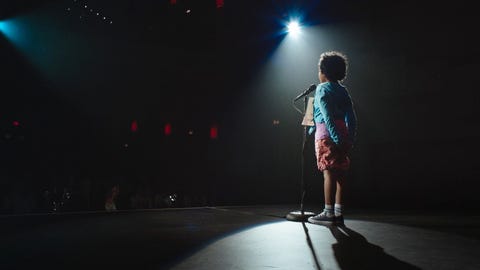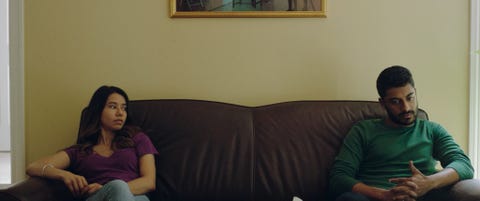A few months ago, during a Zoom talk with a group of aspiring high school filmmakers, one student asked what I thought made for a good movie. My reply was simple: It’s not always about the budget or the A-list star or what fancy camera you shoot on. A good movie is a film that makes you feel drawn to its characters. You root for them loudly because you are invested in them. You’re moved because the performances hit you. And when it ends, depending on the genre, you walk away haunted, gutted, or inspired to do more with your life.
Writer, director, and actress Sujata Day’s debut feature, Definition Please, embodies that description and then some. The South Asian-American family dramedy is a blissful and sobering glimpse into the life of Monica (Day), a former National Spelling Bee champion who just can’t get her life together when the death of her father requires her to care for her ailing mother (Anna Khaja). Of course, she has bigger dreams—moving to Cleveland for a new job, for one—but leaving isn’t that easy. And when her estranged brother (Ritesh Rajan) comes back into town and she meets a sexy stranger (Jake Choi), things get complicated.
This content is imported from YouTube. You may be able to find the same content in another format, or you may be able to find more information, at their web site.
Definition Please is hilarious, which should come as no surprise if you’re familiar with Day’s comedic work as CeCe on Issa Rae’s Misadventures of Awkward Black Girl and Sarah on Insecure. While Definition Please is also a much-needed celebration of South Asian culture and traditions, Day wasn’t afraid to delve into serious issues, tackling the stigma of mental illness and the lasting effects of generational trauma head-on.
ELLE.com sat down with Day to discuss why she didn’t want Monica to be the “model minority,” the importance of female directors greenlighting their own projects, and why being “happy enough” isn’t enough.
What inspired this story? Are you and Monica the same person?
In fourth grade, I won my class spelling bee—there were only 10 students in my grade—but then I went to regionals and I was excited and nervous and went out in the first round. [Laughs] I was devastated and my friends were clowning me when I got back, especially since I went out with such an easy word. But because I loved to read and write, I would always watch the spelling bees on ESPN, and it seemed like so many of the winners were South Asian.
Fast forward to 2015. I was in an Upright Citizens Brigade class and we worked this skit “Where Are They Now?” but for the winners of Scripps National Spelling Bee. Like if you Google the winners, they are working at NASA or someone’s a poker expert, but one of them tends to be unsuccessful. A couple years later, this ended up being my film.
How did you go from scriptwriting to actually making Definition Please?
In 2016, I was in the Sundance New Voices Screenwriting Lab, and alumni gets to attend the film festival. I went to see Justin Chon’s film Gook and I was just blown away. I asked him all these questions, especially around how he got his film made, and when he told me he asked his friends for money and shot it himself, I was like, That’s what I want to do. In 2018, I started pitching the film to production companies and while I got positive reinforcement, there was a lot of, “we’re not interested in doing this now.”
I remember going to Sundance in 2019 and just telling myself, “Ugh, I have to do this.” Instead of waiting for other people to say yes to me, I had to say yes to me. I had gotten a big check from selling a show to a network and faced a dilemma: Should I get a better apartment or a nice couch or go on a vacation? Nah, I’m gonna make my film and I’m gonna shoot it in June 2019, regardless of how much money I have. At that time, I was asking folks to coffee like, “I’m making this movie whether you give money or not,” and once the investors knew I had skin in the game, it was easier to get them in. So I raised money, got my friends to chip in, and we went to Greensburg, Pennsylvania and shot Definition Please in two weeks.
Monica gave me life! Yes, she’s a dutiful daughter taking care of her sick mother, but she also smokes pot, has sex in the front seat of her car, and hasn’t quite lived up to her potential from winning that spelling bee. She’s not the “model minority,” and that’s a good thing, right?
Yes. It was really important for me to make sure that each of the characters had flaws and no one was perfect, because in real life, that’s how it is. I based Monica on myself and the desire to impress my parents and get good grades. I have an engineering degree—I am sort of the model minority too—but I went into entertainment, acting, and writing. Even when I was a growing up in this middle-class suburb, we were all partying and lying to our parents and doing stuff we weren’t supposed to be doing and hiding ourselves. For me, Definition Please was an opportunity to show that South Asian-Americans are more than just the perfect smart technical engineers. There are other sides of us as well.
There are so many themes in this film, including happiness, or being happy enough. So many people are going through the motions of their lives, and seeing Monica struggle with this was so relatable.
“Happy enough” is something I see all around me, especially from childhood. I grew up in a very large Indian community in Pittsburgh, where a lot of people went on to be engineers and doctors, and what saddens me is they are not happy with their lives. Getting their jobs, getting their husbands, and having their kids, they still have this sadness inside of them around the idea of, What am I doing with my life? That was something I broke out of, and that’s something Monica wants to break out of too.
I love that her dream to get out of her town wasn’t to go to the typical NYC or L.A., but to Cleveland. Why was that important to this story?
I wanted to keep the story Midwestern, and I went to college in Cleveland—Case Western Reserve University—and saw that there was a huge conflict between the Browns and the Steelers. It was hilarious. But moving to a bigger city like Cleveland from a small town, those are real dreams. It’s a big deal. I wanted to tap into those emotions of leaving home and being independent but knowing I’m going to miss my parents.
While this film is definitely a comedy, it doesn’t shy away from addressing serious issues. The storyline around Monica’s brother Sonny and his battle with mental illness is so powerful. So often in communities of color, we label it “white people problems.” We rarely get to see South Asian characters grapple with these “taboo” topics on-screen. Not to mention Ritesh’s acting here is brilliant.
The stigma is real, especially among people of color. Growing up in the white suburbs, we had a large Indian community to connect to—there were three temples in Pittsburgh—and amongst my Indian-American friends, there was a lot of mental illness, yet very little acknowledgment that that’s what it was. “Why did Anan run away? We live in a big house. He gets good grades and gets everything he asks for.” Meanwhile, among ourselves, we were like, “Oh, he’s definitely depressed.” I could see the difference between my white friends and my POC friends, because for my white friends, if they were depressed, it would be like, “Oh, I’m in therapy and we talk about it all the time.” I wanted to tackle those differences and tackle mental illness and families, because you either have someone around you who has a mental illness, or you have it yourself. It’s really important to talk about it, treat it like a physical illness, go to therapy, and not be ashamed.
Clearly, we do not have enough female directors, let alone South Asian ones. Those disparities can be disheartening. How do you stay motivated and who inspires you?
My main goal has always been to inspire others, and throughout the years, I have been inspired by amazing Black women like Tracey Oliver, Issa Rae, Debbie Allen, and Tina Mabry, who were thoughtful and kind to me. I doubt myself like everyone else, and it’s tough to see yourself directing when there’s only a handful of us out there actually doing it. I want other women of color in entertainment to be inspired and realize that they can do this. Most importantly, they will know that no matter what, no matter how many people say no or reject them, they can shoot their film regardless.
Definition Please debuted in August at the Bentonville Film Festival and is currently on the film festival circuit winning awards, but we need it to be on streaming so everyone at home can see it. What can you share?
I’m superstitious like my mom so I can’t share much. We’re talking to some exciting buyers right now, so fingers crossed we’ll have an announcement on its public release very soon.
This content is created and maintained by a third party, and imported onto this page to help users provide their email addresses. You may be able to find more information about this and similar content at piano.io


